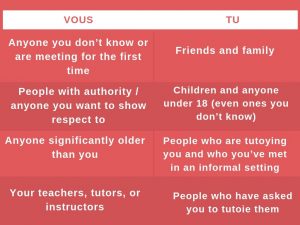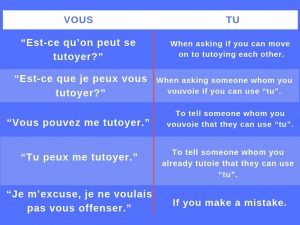
NEOSHAMANS – RUBEN CARRASCO SOLO SHOW
26/09/2019
GET FIT & HAVE FUN – AUSSIE STYLE
20/01/2020TU & VOUS – HOW TO DECIDE WHICH TO USE

Let’s face it, coming from an non-francophone background, the formal ‘vous’ and informal ‘tu’ can be a nightmare for us Anglophones to master.
Here is a great break down of how to implement both and how you can move from from ‘vous’ to ‘tu’!
Author Letty David
What is “vous” and “tu” ?
In English, whoever you’re interacting with is designated by the term “you”. In French as in other romance languages such as Italian, we have an informal term for you; which is “tu”(second person singular), and a “polite” term which is “vous” (second person plural). Although “vous” is used to designate a group of people, it is also used when speaking to anyone you don’t know or wish to show respect to.
Using “vous” is called “vouvoyer” and using “tu” is called “tutoyer”.
Whether to use “vous” or “tu”, that is the question!
Let’s start off with a nice simple rule; use “vous” to everyone except children unless they tell you that it’s OK to “tutoie” them.
Because “tu” is informal, using it incorrectly means you run the risk of insulting people. However, if you use “vous” over-enthusiastically, the worst that could happen is that people might take you for a snob which is much more easily remedied. If you’re a beginner, start off with “vous” and wait to see if the person to whom you are speaking invites you to use “tu”.
It might also be worth pointing out that “tu” is used for animals. 🙂
The following table should help you to decide how pick between “vous” and “tu”, and how to switch from the former to the latter.

Although younger generations are becoming more relaxed about using “tu”, some (usually older) people are still old fashioned and use “vous” within their family or to their life partner even. Tutoying someone that old fashioned could be dangerous as they might even think that you were trying to flirt with them.
Meanwhile, younger more open people are starting to use “tu” more and more; if you’re in a bar, at a party, or in any informal setting, you’re more likely to get tutoyed immediately, especially by anyone under 35. Usually they don’t mean it as a sign of disrespect but as a way of breaking down the barriers and being friendly, and you can afford to tutoie them in return.
Some examples:
I’ve spent a while trying to work out how to explain how to navigate between “vous” and “tu”, and because it’s so complex, I thought some concrete examples might help illuminate it’s subtleties. Here are some of the best examples I came up with. They might give you a headache but read them over a few times and hopefully the lights will pop on in your head and you’ll get it.
My neighbour Marie-France is a 79 year old widow and we’ve become good friends over the last year and a half. For the first 4 months, we used “vous” to each other everyday. Because she’s more senior in rank than me, I wanted to wait for her to make the first move… One day she accidentally used “tu” to me twice and apologised. We were having a nice conversation so I said that I was happy for her to start tutoying me. I said this using “vous” and she immediately said that we should both tutoye each other. Ever since we’ve used tu.
My car mechanic lives across the road from us and is hoping to retire soon. He’s known Marie-France for years, but not as a personal friend; her husband used to be a customer. My garagiste vouvoies Marie-France as a sign of respect, but she uses “tu” to him as a way of showing that she likes him.
Meanwhile, I vousvoie my garagiste as a mark of respect for his rank, his age, and his work. He has recently starting tutoying me (he asked and I agreed) because I’m the same age as his daughter and it felt weird him vouvoying me, especially given the amount of time I’ve recently been spending at the garage (yep, I’m having car problems). However, I will continue using “vous” to my garagiste as a form of respect until the day that he initiates me using “tu”.
This has it’s subtleties though… My doctor is older and in a more senior job than me, and we maintain a strictly professional relationship; even though I’m a lot younger, we both vousvoie each other as a sign of mutual respect and professional courtesy.
I could come up with a trillion more examples for you, but essentially, the tu/vous dance must be treated case by case; every situation is different and therefore must be treated differently. The basic things to remember are:
- if you get a good vibe from someone and you wouldn’t mind them using tu to you, you can always try using tu, or ask if it would be ok.
- If you tutoie someone and they go stiff or look insulted or uncomfortable, apologise and go back to using “vous”.
- If you want to show respect, vous is the place to start.
- If you want someone who respects you to chill out, invite them to tutoie you.
Some key vocabulary:

When you’re having an argument:
If you want to be rude you can use either “tu” or “vous.
If you’ve been tutoying someone but you want to insult them, suddenly changing back to “vous” will symbolise the rift between you; it’s like saying:
“we’re not the same anymore, we’re not friends, you don’t know me and I don’t know you.”
If you’ve been vousvoying someone and you want to express how annoyed you are with them, switching to “tu” is a way of dragging them down to your level, of saying;
“you’re not better than me you know, I’ve been polite to you, but I don’t respect you, and you shouldn’t treat me like I’m a lesser being because you and I are on the same level.”
When I signed up for a driving school and the director of the school automatically tutoyed me without asking, I was very insulted because I wasn’t a 15 year old like all his other students, I was an adult. I insisted on vousvoying him until the day that we got into a very heated argument in which I tutoyed him as a sign of disrespect. After the argument I went back to pointedly vousvoying him.
To conclude, using “tu” can demonstrate disrespect and contempt, which is why if you’re uncertain what to use it’s best to stick to “vous” and risk being a little too formal. As with everything, practice makes perfect, so just get out there and start assessing people and situations and seeing what works for you. Context is everything when choosing between “tu” and “vous”, so learning about French culture and social codes of conduct will help you enormously.
About the author:

Letty David was born and brought up in France but her family is originally British. Being bilingual but not understanding British culture at all, she wanted to learn all about it so she spent 5 years in Scotland catching up on English TV, discovering Scottish music, and bingeing on curry… She is now proud to call herself not only bilingual but bicultural. She is happy to be back in France, even though she knows that she’ll never properly fit in anywhere because she’s not 100% British or French… She is however a true European!
Letty specialises in communications, and she would be happy to connect on LinkedIn here: You can find out about her work as a photographer: www.lettydavid.com / @PhotographyLettyDavid



